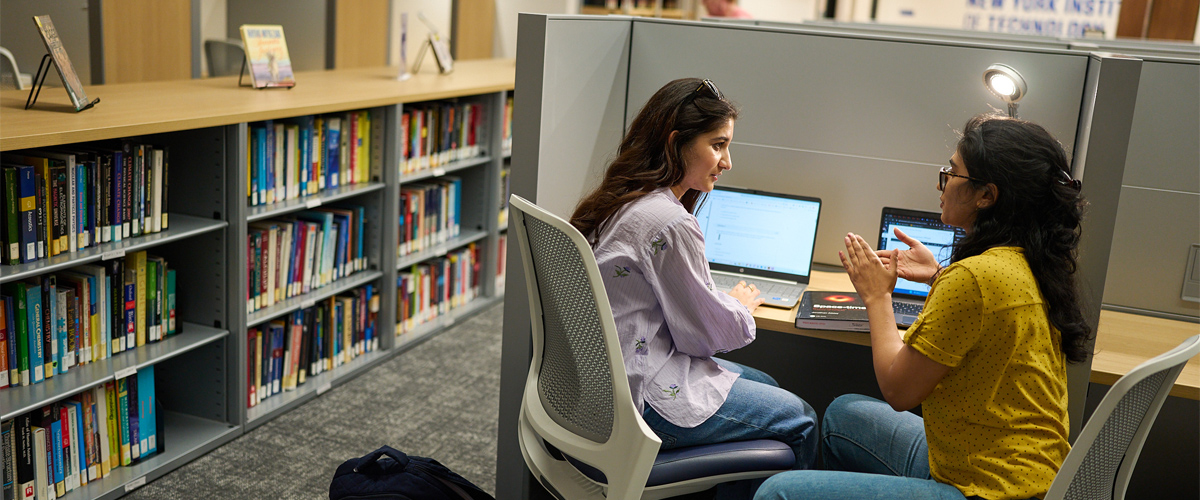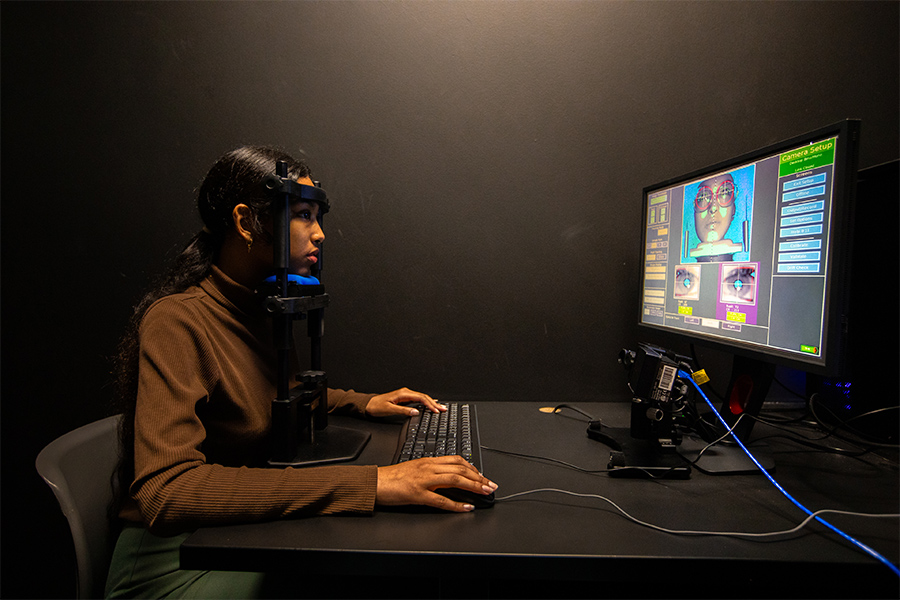
Student Research Opportunities
Would you like to get involved in research? We offer hands-on career-oriented experiences to develop professional competencies. Learn how to work with psychological data, design your own projects, and find answers to the questions that inspire you.
Student research assistants present their discoveries at New York Tech’s annual SOURCE research conference, and travel throughout the country—and sometimes internationally—to present their research at psychology conferences. Get involved and gain a deeper understanding of psychological techniques while preparing for your future career.
Research Faculty

Robert G. Alexander, Ph.D.
Assistant Professor
Robert Alexander’s Human Factors and Neuroscience (HFAN) Lab uses measurements of eye movement behaviors to learn about people and why they do what they do. Your eye movements can reveal a lot about you! Our research aims to create new ways to tell if someone has learned how to accurately perform critical skills (like finding cancerous tumors in chest x-rays), to tell if someone has a clinical condition or not (and how well their medication or other treatments are working), whether someone is a fan of the television show they are watching, and more.
Research Topics:
- Eye Movements
- Visual Neuroscience
- Perceptual Expertise and Expert Performance
- Human Error
- Medical Image Perception
- Radiology

Nicole Calma-Roddin, Ph.D.
Assistant Professor
Nicole Calma-Roddin is a cognitive scientist interested in long-term memory. Her current research is focused primarily on teaching and learning, with a particular interest in how different types of interactive activities impact how well we remember the information presented in those activities. She also studies the learning process and learning experience, including student enjoyment and student engagement. Her recent projects have used virtual reality, games, and songs in learning. Calma-Roddin started her research career as an undergraduate researcher, and she enjoys getting to work with student researchers. Students interested in working on research projects related to these topics should contact Professor Calma-Roddin about opportunities in her lab.
Research Topics:
- Long-term (Semantic) Memory
- Game-based Learning
- Educational Song
- Cognitive (Neuro)Science and Learning
- Psychology & Statistics Education
- Use of Technology in Teaching & Learning

Melissa DiMartino, Ph.D.
Associate Professor
Melissa DiMartino is a social developmental psychologist, and her research focuses on adolescents and emerging adults. She is currently conducting a project, in collaboration with members of the exercise science faculty, to investigate the effects of a before-school exercise intervention on the psychological well-being of middle-schoolers throughout the day. She is also in the beginning stages of a collaboration with the US Army Research Institute of Environmental Medicine (USARIEM), investigating the psychological well-being of soldiers who have concussions during their deployment. She feels passionately that students should design and run their own projects. Students with ideas for project designs should contact Professor DiMartino to discuss potentially implementing the project.
Research Topics:
- Adolescence and Emerging Adulthood
- Intrinsic Motivation
- Community Formation
- Student Learning

Nayoung Kim, Ph.D.
Assistant Professor
Nayoung Kim’s current research focuses on culturally responsive practices and multicultural issues in counseling. One study centers on improving research mentorship through tailored quantitative methods. Other projects investigate mental health stigma in college students and wellness in counseling students, contributing to a deeper understanding of counseling in diverse settings.
Research Topics:
- Counselor Education and Supervision
- Multicultural Issues in Counseling
- Counselor Wellness

Research Courses
Introductory Research Methods (PSYC 370)
This course stresses the classical approach to experimental research on human behavior. Students conduct and report on experiments in the fields of psychophysics, psychomotor learning, memory, and perception. These laboratory experiments permit the student to apply knowledge gained in former courses about measurements, statistical inference, and the design of experiments.
Supervised Research in Psychology (PSYC 481, 482, 483)
Training and participation in techniques or duties related to a specific laboratory or field research experience under the direct supervision of a faculty member in the Department of Psychology & Counseling. Students will discuss a set of research goals for the semester with their professor. Students’ responsibilities will vary based on the research goals set by the professor. Example responsibilities include study design, data collection, data entry, IRB proposals, statistical software training, and presentations both internally at New York Tech and externally. Research may be a self-designed study from the student or established research as an assistant in an existing laboratory.
Who should register for this course?
Any student interested in pursuing research-oriented careers or who is considering graduate school should consider completing at least one semester of supervised research.
How do I register?
Students should contact an individual psychology faculty member who they would like to work with (see our Research Opportunities page for ideas!). If appropriate, the faculty member will provide permission for you to enroll in the course.